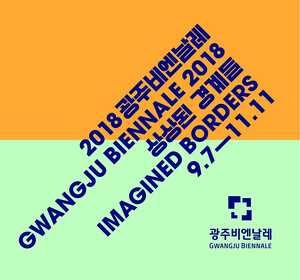Including new commissions and pavilions project
September 7–November 11, 2018
The 12th Gwangju Biennale, Imagined Borders has reached the halfway point of its 66 day journey to explore the meaning and role of borders from the physical to the psychological in contemporary culture. Launched in 1995, the Gwangju Biennale is Asia’s oldest, largest and most ambitious biennale of contemporary art, and has welcomed over 140,000 visitors since it opened on the September 7.
Imagined Borders, presents 163 artists from 42 different countries this year, in a series of seven exhibitions curated by 11 curators to explore the concept of contemporary borders, and suggest a new aesthetic methodology to the international art world. Global art figures and artists attended the opening ceremony held on September 6 which featured media performances by Lee Lee Nam, and a welcome speech from Gwangju Biennale President Sunjung Kim.
The 2018 Gwangju Biennale explores the theme of Imagined Borders in a series of seven exhibitions put together by a collective of 11 curators. “Imagined Nations / Modern Utopias” curated by Clara Kim; “Facing Phantom Borders” curated by Gridthiya Gaweewong; “The Ends: The Politics of Participation in the Post-Internet Age” co-curated by Christine Y. Kim and Rita Gonzalez; and “Returns” curated by David Teh are presented in the Gwangju Biennale Exhibition Halls. The other three sections; “Faultlines” curated by Chung Yeon Shim and Yeewan Koon; “The Art of Survival” jointly curated by Kim Sung woo, Kim Man seok and Paek Chong-ok; and “North Korean Art: Paradoxical Realism” curated by BG Muhn are presented in the Asia Culture Center.
2018 marked the launch of the GB Commission, a project which encourages individual artists to take inspiration from the location and history of the city to shed new light onto the story and spirit of Gwangju. Mike Nelson, Kader Attia, Adrián Villar Rojas and Apichatpong Weerasethakul have incorporated the theme of the biennale at former Armed Forces’ Gwangju Hospital and at Asia Culture Center. Mike Nelson who is showing “Mirror Reverb” stated, “I felt the history and a sense of absence embedded in the vacant buildings and restructured various component parts with evidence of compressed time.”
Also, for the first time ever, the newly launched Pavilion Project marks Gwangju as a forum of contemporary art by forming partnerships with leading international art institutions. Prominent institutions take part in the Pavilion Project’s inaugural exhibition; Palais de Tokyo, Asia Culture Centre and the Asia Culture Institute present “Today Will Happen” at the Gwangju Civic Center; Helsinki International Artist Programme, Helsinki’s most prominent international residency program and nonprofit artists’ union established in 1998, presents “Fictional Frictions” at Mugaksa Temple; and the Philippine Contemporary Art Network invites visitors to the newly opened Leekangha Art Museum and Hothouse in the Buk-gu area of Gwangju.
The opening ceremony for the 12th Gwangju Biennale was attended by the first lady Kim Jeong-sook, Mayor of Gwangju Lee Yong-sup, director of London’s Hayward Gallery and 2019 Venice Biennale Ralph Rugoff; along with participating curators and artists, as well as 1500 citizens of Gwangju and the surrounding area. On the official previews of September 7th and 8th, an international symposium and “GB Commission: Curators and Artist Talks” were held at the Gwangju Biennale Geosigi Hall and the Asia Culture Center while various performances at the Geumnamno Fountains delighted visitors.
First lady Kim Jung-sook recognized the theme of Imagined Borders for the 12th Gwangju Biennale in her congratulatory address and remarked: “When human beings relate to and feel compassion for the pain of others is when humanity transcend all borders and live with dignity.” With regard to BG Muhn’s North Korean exhibition section, the first lady commented, “It is a meaningful exhibition which reconnects the 70 years of severance between the two Koreas through art” and that “the differences between the two Koreas could be gradually resolved by meeting though such diverse passages.”
Sunjung Kim, President of the Gwangju Biennale Foundation said:
“We are delighted to have welcomed thousands of visitors to explore the most ambitious edition of the Gwangju Biennale yet, Imagined Borders. The Biennale is a unique platform to showcase artists and artworks in a context that is international and continually evolving, welcoming some of the most talented curators and arts organisations from around the world to engage with ideas of borders today, and with the history of Gwangju. On behalf of the Gwangju Biennale Foundation, I would like to thank all the curators and artists of the 12th Gwangju Biennale who have worked tirelessly to interrogate one of our most pressing topics today, that of borders in a globalised world.”

